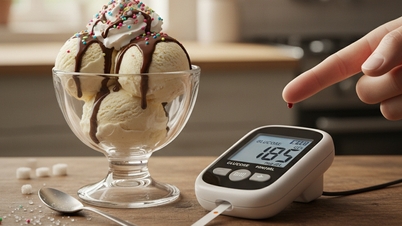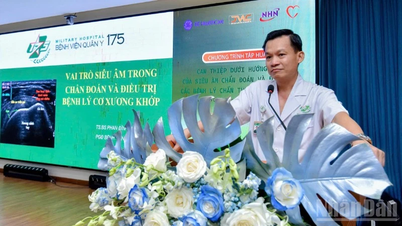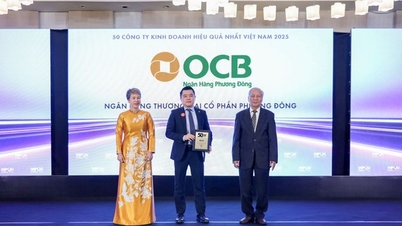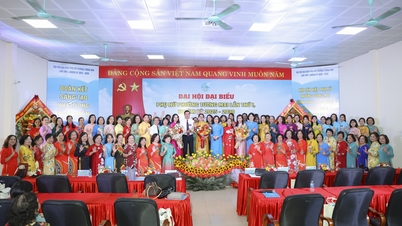Egg freezing opens up a lot of hope for infertile couples, along with ensuring the opportunity to have children for women who are focusing on their careers, people with reproductive-related diseases, and those with serious illnesses...
Egg freezing: A new trend among young people and a lifesaver for infertile couples
Egg freezing opens up a lot of hope for infertile couples, along with ensuring the opportunity to have children for women who are focusing on their careers, people with reproductive-related diseases, and those with serious illnesses...
The first egg freezing procedure was performed in 1986. Up to now, this technique has been increasingly developed and there are many patients and cases in need of performing it.
 |
| Egg freezing opens up a lot of hope for infertile couples, along with ensuring the opportunity to have children for women who are focusing on their careers, people with reproductive diseases... |
In the world , egg freezing is becoming a trend of choice for progressive women in the era of globalization. In Vietnam, egg freezing is increasingly receiving attention from the community.
The Center for Reproductive Support and Tissue Transplantation Technology, Hanoi Medical University Hospital has received and consulted many young couples, many unmarried women,... who want to learn about egg donation service to get pregnant later.
In 2023 alone, at the Center for Reproductive Support and Transplant Technology - Hanoi Medical University Hospital, doctors performed more than 300 egg retrieval and freezing cycles for patients.
According to Dr. Trinh Thi Ngoc Yen, Center for Reproductive Support and Transplant Technology, Hanoi Medical University Hospital, there is a general trend that everyone is very concerned about women's reproductive health.
In particular, in the current period, the trend of infertility is gradually getting younger. The hospital has encountered many young cases, when they went for examination, they discovered that their ovarian reserve had been greatly reduced. There were even cases born in 1998-2000 who had to freeze their eggs.
For example, recently, the hospital received a case of a girl born in 1998 in a similar situation. When she came here, her ovarian reserve was already depleted. Therefore, the only way we had to advise and prescribe that patient to freeze her eggs to preserve her ability to become a mother in the future.
Besides, the interest and understanding of young people is much better than before. Many people have gone for pre-marital health check-ups. This has helped them know their ovarian reserve so that they can have the right attitude and treatment in having children.
Secondly, women today tend to be independent, taking on roles in society and also financially independent. They tend to marry later and are self-sufficient in all aspects of life. At the same time, their awareness of reproductive issues is also increasingly better. They have many channels to access information.
Physiologically, as a woman ages, the quality of her ovaries will gradually decline. In particular, after the age of 35, the quantity and quality of eggs will decrease significantly. After this age, the chance for a woman to get pregnant with her own eggs is greatly reduced.
The ideal age and the highest chance of getting pregnant in women is between 20 and 29 years old. After that, it starts to decrease gradually, especially after 35 years old.
From the age of 35, in addition to the decreased pregnancy rate, the rate of miscarriage and stillbirth increases. Therefore, the chance of a woman having a healthy child after the age of 35 is very low. Therefore, when becoming more independent, women today think a lot about freezing their eggs to preserve their future fertility.
For example, when they freeze their eggs at the age of 30 due to some factors, and then get married at around 35-36 years old, we still prioritize using their own eggs to conceive naturally.
In case you cannot conceive naturally, you should go back to using frozen eggs. When using eggs frozen at age 30, the chance of pregnancy as well as the risk for the next cycle is only calculated at age 30, not 35 as at the current age. That is the advantage of freezing eggs.
Those who do not have a partner and do not intend to get married should go for a check-up and reproductive health check-up to get advice from a doctor.
If the time to get married is too long and the ovarian reserve is not good, they should freeze eggs to have a backup plan for their future.
If testing to evaluate ovarian reserve, there are many places that can do it such as provincial hospitals, even private centers can test to evaluate ovarian reserve. The most common test is the AMH index.
Egg freezing can only be done at facilities with reproductive support centers. Egg freezing is a special and difficult technique. Because eggs are the most special cells in a woman's body.
Generally, cryopreservation techniques in assisted reproduction include: egg freezing, sperm freezing, embryo freezing and ovarian and testicular tissue preservation. Among them, egg freezing is almost the most difficult technique.
Regarding the egg freezing process, according to doctors, the process will begin when the woman begins her menstrual cycle to examine and evaluate her ovarian reserve as well as her general health.
In conditions where all conditions are met for using ovarian stimulation drugs, monitor ovarian response by transvaginal ultrasound and hormone testing; inject ovarian maturation drugs.
Then, the eggs are aspirated. After collecting the eggs, the doctors in the Lab will evaluate the eggs, separate the granulosa cells outside to collect the eggs. Accordingly, the mature eggs will be frozen and stored. It takes about 2 weeks.
The number of eggs frozen depends on the woman’s ovarian reserve and her response to ovarian stimulation medication. Studies have shown that 15 eggs is the number expected to be frozen for a successful outcome, with no difference between fresh and frozen eggs.
Later, if the woman is married, they will use the frozen eggs combined with the husband's sperm to create embryos, transferred into the woman's body to have children. If not married and want to have children, the woman will ask for sperm from a sperm bank to create embryos.
All current studies support this view and evidence also shows that using frozen eggs and fresh eggs does not have any difference in results such as fertilization rate, embryo creation rate, pregnancy, good pregnancy, healthy pregnancy...
This success rate depends largely on the age of the woman at the age of egg freezing. In addition, it also depends on the number of frozen eggs, the culture conditions, the lab performing the procedure...
Associate Professor, Dr. Nguyen Manh Ha, Head of the Department of Tissue - Embryology, Hanoi Medical University, Director of the Center for Reproductive Support and Tissue Transplantation Technology, Hanoi Medical University Hospital, informed that the cases coming to freeze eggs fall into 2 groups: The group for medical reasons such as wanting to preserve fertility before cancer treatment, not having sperm to fertilize or needing to collect accumulated eggs and the group for social issues.
The number of patients coming for social reasons such as not wanting to get married, not intending to get married, young people proactively coming to freeze eggs, has increased in the past 3 years. In addition, cases before gender transition also come to freeze eggs.
The trend of egg freezing is increasing. One is due to medical reasons, more and more cancer patients are concerned about preserving the ability to have children after treatment.
"At the same time, patients with too few eggs are forced to collect them to have enough for fertilization. Second, the age of marriage is currently increasing, modern women tend to marry late, while fertility does not last over time, it will decline after the age of 35," Associate Professor Ha said.
Regarding the cost of egg freezing, Associate Professor, Dr. Nguyen Manh Ha said, it is usually around 40-50 million VND including the cost of examination, testing, egg retrieval, etc. To maintain the frozen preservation of eggs in frozen tubes, the annual cost is 1.7 million VND/tube.
Regarding doubts about the quality of frozen eggs, Associate Professor Ha affirmed that according to studies around the world, the live birth rate and embryo creation rate are not different between frozen eggs and fresh eggs. At the same time, with frozen eggs, the rate of children born, their psychology, weight, birth defects rate, as well as their later development are not different.
Associate Professor, Dr. Nguyen Manh Ha warns that, unlike sperm storage, egg freezing is not a simple technique, the procedure is the same as in vitro fertilization, only lacking the embryo creation process behind. Therefore, women should not follow the trend but need to think carefully, should only do it when there is a real need and it is appropriate.
Source: https://baodautu.vn/tru-dong-trung-xu-the-moi-cua-nguoi-tre-va-cuu-canh-cho-cac-cap-vo-chong-hiem-muon-d229397.html


![[Photo] The 4th meeting of the Inter-Parliamentary Cooperation Committee between the National Assembly of Vietnam and the State Duma of Russia](https://vphoto.vietnam.vn/thumb/1200x675/vietnam/resource/IMAGE/2025/9/28/9f9e84a38675449aa9c08b391e153183)
![[Photo] High-ranking delegation of the Russian State Duma visits President Ho Chi Minh's Mausoleum](https://vphoto.vietnam.vn/thumb/1200x675/vietnam/resource/IMAGE/2025/9/28/c6dfd505d79b460a93752e48882e8f7e)
![[Photo] Joy on the new Phong Chau bridge](https://vphoto.vietnam.vn/thumb/1200x675/vietnam/resource/IMAGE/2025/9/28/b00322b29c8043fbb8b6844fdd6c78ea)


























































































Comment (0)